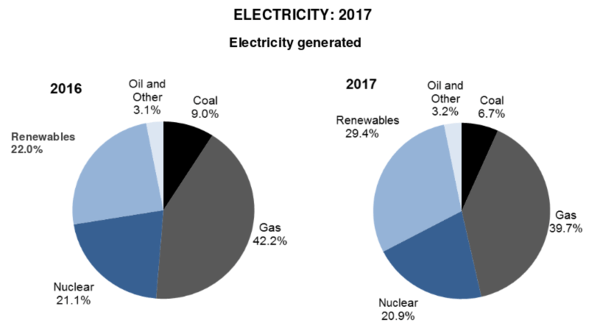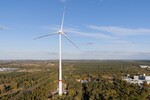News Release from windfair.net
Wind Industry Profile of
UK Leads The Way: Renewables March Past Coal And Nuclear Power
While still a hot topic in Germany, the British have long since enshrined the phase-out of coal by law. And within just five years they have even managed a double turnaround: In 2017, wind and solar supplied more energy than the country's nuclear power plants for the first time, as new figures of the Department for Business, Energy & Industrial Strategy show. Moreover, in just five years they have doubled the share of renewables in relation to coal. In 2017, renewables in electricity generation rose to 29.4 percent, with nuclear energy accounting for around 21 percent.
Together, these two energy sources broke the 50 percent mark for the first time in 2017. It is therefore thanks to them that the British have also emitted 3 percent less greenhouse gases.
Wind energy in particular has contributed to the good statistics, as industry association RenewableUK points out: 15% of Great Britain's total electricity demand is now covered by wind energy. In the previous year, the share was still 11 percent, but due to capacity increases and higher wind speeds an increase of almost a fifth can be marked - a record. Wind energy now supplies 12.7 million households in the UK.
“These official figures confirm that it’s been another record-breaking year for wind energy, which generated 15% of the UK’s electricity in 2017. The move to a smart, renewables-led energy system is well underway," said RenewableUK’s Executive Director Emma Pinchbeck. "The cost of new offshore wind halved in 2017 and onshore wind is already the cheapest of any new power source in the UK. So it’s vital that new onshore wind should be allowed to compete in the market for the sake of consumers.”

Power production in Great Britain in comparison 2016/2017 (Image: British government)
So everything's going fine in the UK? Not quite, because although the potential of renewables is far from exhausted thanks to expected technological improvements in the coming years, the British government is sticking to its plans to build a new nuclear power plant. Hinkley Point C has been under criticism for a long time, because costs continue to explode - and from an energy policy point of view the construction of the plant is no longer necessary anyway. However, the permits date from times when offshore wind was still in its infancy - while the UK is now world champion in this type of energy supply.
And there is trouble with onshore wind: a few years ago, the UK imposed a ban on subsidies for onshore wind farms. In the eyes of many experts, this is outdated and prevents the expansion of the British energy infrastructure. "So it’s vital that new onshore wind should be allowed to compete in the market for the sake of consumers," demands Pinchbeck.
As various studies, including those by the International Renewable Energy Agency, have shown, onshore wind farms in particular are already capable of outperforming fossil fuels. “The plunging price of renewables is allowing low carbon energy to replace coal and gas,” says Nina Schrank, energy campaigner for Greenpeace UK, in the Independent.
So despite the ban on coal, there is still room for improvement in the UK.
- Author:
- Katrin Radtke
- Email:
- press@windfair.net
- Keywords:
- UK, Britain, Germany, coal, nuclear, wind energy, onshore, offshore, RenewableUK, Greenpeace, ban, subsidy




























